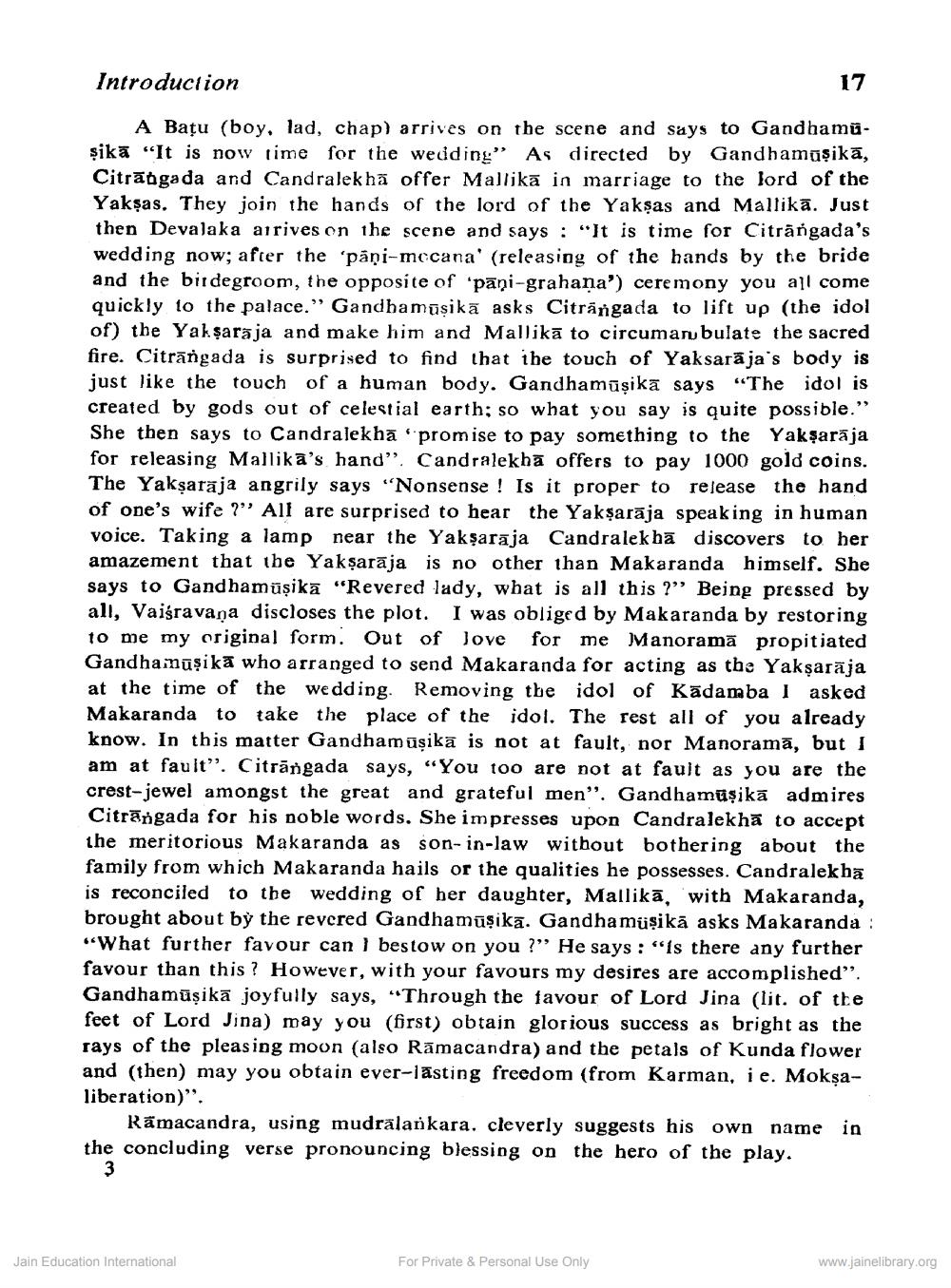________________
Introduction
17
A Baţu (boy, lad, chap) arrives on the scene and says to Gandhamuşikā “It is now time for the wedding." As directed by Gandhamūşikā, Citrāngada and Candralekhă offer Mallika in marriage to the lord of the Yakşas. They join the hands of the lord of the Yakşas and Mallikā. Just then Devalaka arrives on the scene and says : "It is time for Citrāngada's wedding now; after the 'pani-mccana' (releasing of the hands by the bride and the birdegroom, the opposite of 'pāņi-grahana') ceremony you all come quickly to the palace." Gandhamūşikā asks Citrängada to lift up (the idol of) the Yaksara ja and make him and Mallikā to circumaru bulate the sacred fire. Citrāngada is surprised to find that i he touch of Yaksarāja's body is just like the touch of a human body. Gandhamūşikā says "The idol is created by gods out of celestial earth; so what you say is quite possible.” She then says to Candralekha 'promise to pay something to the Yakşarāja for releasing Mallika's hand”. Candralekhā offers to pay 1000 gold coins. The Yakşarāja angrily says “Nonsense! Is it proper to release the hand of one's wife ?" All are surprised to hear the Yakşarāja speaking in human voice. Taking a lamp near the Yakşaraja Candralekhā discovers to her amazement that the Yakşarāja is no other than Makaranda himself. She says to Gandhamüșika "Revered lady, what is all this ?” Being pressed by all, Vaigravana discloses the plot. I was obliged by Makaranda by restoring to me my original form. Out of love for me Manorama propitiated Gandhamuşikā who arranged to send Makaranda for acting as the Yakşarāja at the time of the wedding. Removing the idol of Kādamba I asked Makaranda to take the place of the idol. The rest all of you already know. In this matter Gandhamūşikā is not at fault, nor Manoramā, but I am at fault”. Citrāngada says, “You too are not at fault as you are the crest-jewel amongst the great and grateful men”. Gandhamuşikā admires Citrāngada for his noble words. She impresses upon Candralekha to accept the meritorious Makaranda as son-in-law without bothering about the family from which Makaranda hails or the qualities he possesses. Candralekhā is reconciled to the wedding of her daughter, Mallikā, with Makaranda, brought about by the revered Gandhamūşikā. Gandha müşikā asks Makaranda : “What further favour can I bestow on you?” He says: “Is there any further favour than this? However, with your favours my desires are accomplished”. Gandhamüşikā joyfully says, “Through the favour of Lord Jina (lit. of the feet of Lord Jina) may you (first) obtain glorious success as bright as the rays of the pleasing moon (also Rāmacandra) and the petals of Kunda flower and (then) may you obtain ever-lasting freedom (from Karman, i e. Mokşaliberation)".
Rämacandra, using mudralankara. cleverly suggests his own name in the concluding verse pronouncing blessing on the hero of the play.
Jain Education International
For Private & Personal Use Only
www.jainelibrary.org




